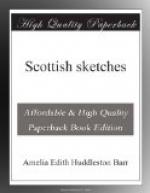“How old is young McFarlane?” asked James.
“He is turned twenty—a braw lad, his father says. I hae ne’er seen him, but he’s Jessie’s bairn, and my heart gaes out to meet him.”
“Why did you not tell me on Saturday, father? I could have spoken for Maggie Maclean to help me put the house in order.”
“I didna get the letter till the evening post. It was most as good as Sabbath then. Housecleaning is an unco temptation to women-folk, so I keepit the news till the Sabbath sun was weel set.”
During this conversation James Blackie’s heart had become heavy with some sad presentiment of trouble, such as arise very naturally in similar circumstances. As a poet says,
“Ah, no! it is not all delusion,
That strange intelligence
of sorrow
Searching the tranquil heart’s seclusion,
Making us quail before the
morrow.
’Tis the farewell of happiness departing,
The sudden tremor of a soul
at rest;
The wraith of coming grief upstarting
Within the watchful breast.”
He listened to David Cameron’s reminiscences of his bonnie sister Jessie, and of the love match she had made with the great Highland chieftain, with an ill-disguised impatience. He had a Lowlander’s scorn for the thriftless, fighting, freebooting traditions of the Northern clans and a Calvinist’s dislike to the Stuarts and the Stuarts’ faith; so that David’s unusual emotion was exceedingly and, perhaps, unreasonably irritating to him. He could not bear to hear him speak with trembling voice and gleaming eyes of the grand mountains and the silent corries around Ben-Nevis, the red deer trooping over the misty steeps, and the brown hinds lying among the green plumes of fern, and the wren and the thrush lilting in song together.
“Oh, the bonnie, bonnie Hielands!” cried David with a passionate affection; “it is always Sabbath up i’ the mountains, Christine. I maun see them once again ere I lay by my pilgrim-staff and shoon for ever.”
“Then you are not Glasgow born, Mr. Cameron,” said James, with the air of one who finds out something to another’s disadvantage.
“Me! Glasgo’ born! Na, na, man! I was born among the mountains o’ Argyle. It was a sair downcome fra them to the Glasgo’ pavements. But I’m saying naething against Glasgo’. I was but thinking o’ the days when I wore the tartan and climbed the hills in the white dawns, and, kneeling on the top o’ Ben Na Keen, saw the sun sink down wi’ a smile. It’s little ane sees o’ sunrising or sunsetting here, James,” and David sighed heavily and wiped away the tender mist from his sight.
James looked at the old man with some contempt; he himself had been born and reared in one or other of the closest and darkest streets of the city. The memories of his loveless, hard-worked childhood were bitter to him, and he knew nothing of the joy of a boyhood spent in the hills and woods.




